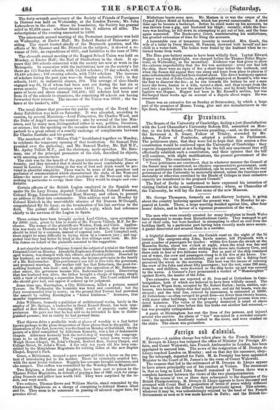Vruniutro.
The Senate of the University of Cambridge, feeling a just dissatisfaction with the Lord Chancellor's University Reform Bill, assembled on Mon- day, in the Arta School,—the Proctors presiding,—and, on the motion of ' the Reverend A. R. Grant, Fellow of Trinity, seconded by Mr. Adams, Fellow of Pembroke, adopted a petition to Parliament._ The petitioners state, that they were led to hope that this session a free constitution would be conferred upon the University of Cambridge : theyp express disappointment at not finding in the bill any enactment that effectually establish such a constitution, and their opinion that the bill' will continue, with slight modifications, the present government of the' University. The conclusion is- " Your petitioners are convinced, that in whatever manner the Council of the Senate may be constituted, no effective representative government, such as your petitioners desire to see established, can be secured, nor will the real government of the University. be materially altered, unless the functions now statutably or otherwise exercised by the Heads of Colleges in their collective' capacity are transferred to the proposed Council."
The Earl of Derby is understood to have expressed his intention of visiting Oxford at the coming Commemoration ; where, as Chancellor of the University, he will lay the first stone of the new Museum.
Mr. George Thompson, formerly an Anti-Slavery lecturer, is going about the country lecturing against the present war. On Monday he ap- peared at Leeds. There, a large meeting decided against him, after four' hours' debate, and in favour of a vigorous prosecution of the war.
The men who were recently arrested for many burglaries in South Wales have attempted to escape from Haverfordwest Castle. They managed to get out of their cells, but were baulked in attempting to effect an exit from the building itself, by a particular part having been recently made more secure. A gaoler discovered and secured them in a corridor.
A frightful disaster occurred on the Cornish coast on the night of the 3d instant. The emigrant-ship John, Rawle master, left Plymouth with e great number of passengers for Quebec : within five hours she struck on the Manacles Rocks, about ten o'clock at night, when the wind was fair and the weather tolerably clear ; after striking she drove into Godrevy Cove, and there sank in four or five fathoms water. But as part of the ship remained out of water, the crew and passengers clung to it for five or six hours. Un- fortunately, the coast is uninhabited, and no aid came till a fishing-boat perceived the wreck in the morning. This boat was the means of rescuing the crew of the John and about fifty passengers ; but the rest, some 200 men,, women, and children, were drowned as the ship broke up and was covered' by the waves. A Coroner's Jury pronounced a verdict of "Manslaughter" against Rawle, the master of the John.
Two extensive fires are reported at St. Ives and at Cottenham in Cam- bridgeshire, both of which are believed to have been wilfully caused. The first was at Wigan farm, occupied by Mr. Robert Barton ; barns, stables, out- houses, two horses, thirty-four fine ranch cows, and six fat beasts, were de- stroyed ; and the total loss, covered by insurances, is estimated at 6000/. At Cottenham—so often ravaged by great fires—no fewer than twenty houses, with many other buildings, were swept away : a hundred persons were ren- dered homeless. The value of the property destroyed is rated at above 5000/. A very short time before this fire broke out another had occurred,— but was promptly extinguished.
A panic at Birmingham has cost the lives of five persons, and injured. several who survive. An alarm of " fire " was raised in a crowded concert- room ' • the spectators heedlessly rushed to the doors, and were crushed on. the stairs. The alarm was groundless.


























 Previous page
Previous page